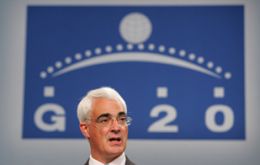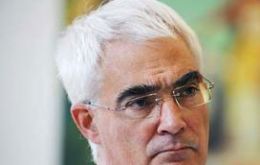MercoPress. South Atlantic News Agency
International
-
Monday, September 7th 2009 - 14:42 UTC
Iran and Chavez to fight “imperialist” foes and help revolutionary nations

Iran and Venezuela plan to stand up against “imperialist” foes by strengthening bilateral cooperation on a range of issues, including nuclear power, Iranian President Mahmoud Ahmadinejad said over the weekend.
-
Monday, September 7th 2009 - 14:32 UTC
Crucial WTO ruling on the “jumbo” dispute over subsidies in plane industry

World Trade Organization (WTO) has given its long-awaited ruling on the biggest trade dispute in its history. The decision, which is officially confidential, is over whether the European Union gave illegal subsidies to plane-maker Airbus as the US argues.
-
Monday, September 7th 2009 - 14:28 UTC
UK prepares for budget deficit and spending debate

United Kingdom Chancellor Alistair Darling is set to unveil plans within the next few months to halve the Government's spending deficit over four years, his deputy at the Treasury said.
-
Monday, September 7th 2009 - 14:08 UTC
China’s top 500 corporations outperformed the US top 500, says Beijing

Profits of the top 500 Chinese corporations in 2008 exceeded that of their United States counterparts. Gains for the full year in 2008 totalled 1.21 trillion Yuan (177.17 billion US dollars), much more than the 98.9 billion USD from the top 500 US firms in the same period.
-
Sunday, September 6th 2009 - 18:33 UTC
G20 vow to keep spending high

The Group of 20 finance ministers have pledged to maintain stimulus measures such as extra government spending and low interest rates to boost the global economy.
-
Saturday, September 5th 2009 - 13:11 UTC
Conservative presidential candidate remains clearly ahead in opinion polls

The latest Centre of Public Studies (CEP) poll, released Thursday, shows Chilean presidential candidate Sebastián Piñera of the conservative Alianza coalition maintains a nine-point lead over Senator Eduardo Frei in a hypothetical first-round presidential election.
-
Saturday, September 5th 2009 - 13:06 UTC
Leading economist Roubini warns of “U shaped” or “W shaped” recovery

Leading economist Nouriel Roubini who predicted the global financial crisis said Friday in Italy that he expects a slow recovery for advanced economies, but emerging economies may experience a quicker more robust growth.
-
Saturday, September 5th 2009 - 06:32 UTC
Controversy over bankers’ bonuses at Finance minister summit in London

A cap on bonuses paid to London City bankers would be “enforceable” UK Chancellor of the Exchequer Alistair Darling warned on Friday. Proposals to curb excessive pay and bonuses are being pushed by European nations at the two-day meeting of Finance ministers from the G20 group of major economies being hosted by Mr. Darling in London.
-
Saturday, September 5th 2009 - 06:14 UTC
PM Brown hints to earlier-than-expected withdrawal from Afghanistan

UK Prime Minister Gordon Brown paved the way for an earlier-than-expected withdrawal of British troops from Afghanistan as he called for training of Afghan forces to be accelerated.
-
Saturday, September 5th 2009 - 06:09 UTC
Bank of England expands quantitative easing by £ 50 billion to £ 175 billion

The Bank of England on Friday held interest rates at 0.5% as expected, but expanded its quantitative easing program by £50 billion to £175 billion. In a letter to the chancellor Alistair Darling, Bank of England governor Mervyn King said the move was essential to meet the central bank’s long term inflation target of 2% or 1% either side.
